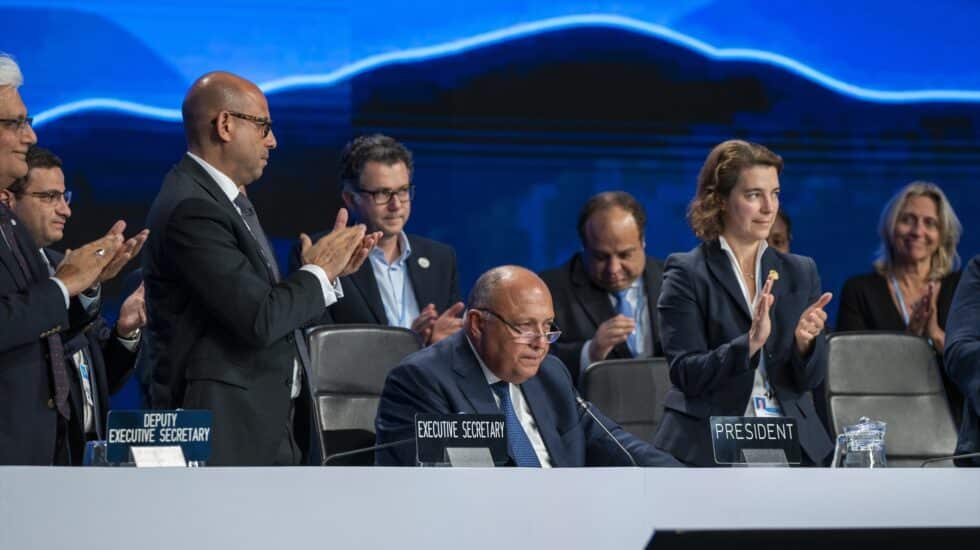

Closing COP27.
The climate diplomacy of COP27, held in Egypt, was unable to cope with the circumstances in which it was held. The energy crisis caused by the war in Ukraine was marked by the annual meeting of the Conference of the Parties, established by the UN to address the climate change emergency that affects the Earth.
The pressure from the oil-producing countries was particularly acute at the summit, where the European Union threatened to withdraw because of the backward steps left by the final document.
Frans Timmermans, Vice President of the European Commission, admits in the COP27 assessment, he does not hide his disappointment. “After Glasgow we lost a lot of speed. We have already lost a lot of time, and our people and our planet have nothing more to lose, ”he said. “Our citizens expect us to lead the way, which means cutting emissions much faster. This is how we limit climate change. Don’t wait and react when climate change has devastating consequences,” he added.
The great victory for the oil producers is that the new language includes “low-emission” energy along with renewables as the energy sources of the future. What a lack of certainty that moves the COP away from the recommendations of the IPPC, the scientific tool that was created to guide the decisions of the climate diplomacy of these summits.
“Energy transfer and fossil fuel phase-out agreements seem out of reach at COP27. Now more than ever, we need to meet the challenge of limiting global temperature rise to 1.5ºC. Every fraction of the increase means higher costs, more damage and more deaths,” he says. Vanesa Castan Broto from the University of Sheffield and an IPCC expert in statements to the Science Media Center of Spain.
This summit featured representatives from the fossil fuel industry. The European Climate Fund counted up to 600 representatives in the COP corridors. “The influence of the fossil fuel industry has been found everywhere. This COP has relaxed the requirements for countries to take on new and more ambitious commitments. The text makes no mention of phasing out fossil fuels and makes little mention of science and the 1.5 degree goal,” he says. Lawrence Toubiana, Director of the European Climate Fund who also expresses his concerns about COP28 to be held in the United Arab Emirates: “The Egyptian Presidency has produced a text that clearly defends the oil and gas petrostates and the fossil fuel industries. This trend cannot continue in the United Arab Emirates next year.”
From a political point of view Florent Marchellesi, representative of Verdes Equo, finds it “extremely disappointing and troubling that climate ambitions in Egypt have not increased. Due to the blockade of the oil countries and Russia, the final text of COP27 does not improve on the climate targets set last year in Glasgow, nor does it take any steps to phase out all fossil fuels. However, the scientific community is clear: with current climate targets, temperatures will rise well above the safe threshold to avoid the worst effects of climate change.”
Establishment of an indemnity and damages fund
The most positive part of the high-level talks is an agreement to create a fund to help the most vulnerable countries cope with the effects of the climate crisis. The creation of this fund is a historic demand of civil society. “Agreement A. Loss and Loss Financing Fund marks the beginning of a new path towards climate justice. Governments have laid the cornerstone of a new, long-needed fund to provide vital support to vulnerable countries and communities already affected by the accelerating climate crisis,” he says. Yeb Sanyo, Executive Director of Greenpeace Southeast Asia and Head of the Greenpeace Delegation to COP27.
“This result keeps us moving forward,” he said. Simon Steele, UN Executive Secretary for Climate Change. “This is a historic result that benefits the most vulnerable people around the world. We have charted the way forward in a multi-year conversation about loss and damage financing, considering how to deal with the impact on communities whose lives and livelihoods have been hit by the worst effects of climate change.”
Known as the Sharm El Sheikh Implementation Plan, the entry decision highlights that the global transition to a low-carbon economy is expected to require investment of at least $4-6 trillion a year. Obtaining this funding will require a rapid and complete transformation of the financial system, its structures and processes, involving governments, central banks, commercial banks, institutional investors and other financial actors.
For many, talk of success with financial aid commitments speaks volumes, especially when the 2020 goal of a $100 billion fund to help poor countries with money from developed countries has yet to be met.
Source: El Independiente